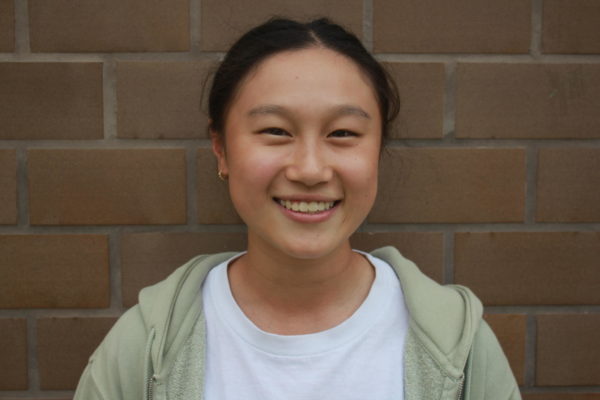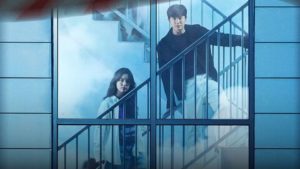“The Glory” takes revenge to the next level
Part 2 of the suspenseful K-drama, “The Glory,” returned to Netflix on March 10, 2023, after the success of Part 1. Inspired by a true school bullying case, writer Kim Eun-sook portrays the brutality of bullying and how victims deal with the physical and emotional pain they suffered. This two-part drama tells the story of a victim of school bullying, Moon Dong-eun (Song Hye-kyo), as she meticulously plans her revenge on her cruelest tormenter, Park Yeon-jin (Lim Ji-yeon), for a perfect execution. Narrated in a letter format, Dong-eun continuously says, “an eye for an eye, a tooth for a tooth,” as she describes her extreme hatred for Yeon-jin and the other perpetrators, determined to make them suffer as much as she has, if not more.
Secured in a wealthy and influential family, Yeon-jin isn’t afraid to go to extremes when her classmates irritate her, harming students including Dong-eun. Yeon-jin’s friends also team up against the victims, however their insecurities and tensions towards each other become evident, eventually tearing their friendship apart.
From sexual to physical harassment, Dong-eun’s scars from Yeonjin repeatedly burning her with a curling iron all over her body are only a portion of the pain she has endured. Deeper than these physical scars are her emotional scars, leaving her lifeless even though she is still physically alive. While those physical scars will never leave, they don’t torment her as much as the emotional trauma these events have left her. The bullying scenes were brutal to watch, but the authenticity of how they were portrayed illustrates the true horrors of school violence that are so often glossed over by the media.
Not only do these bullies strip Dong-eun bare, quite literally, but so does her only family member. Her mother happily accepts the money offered by Yeonjin’s mom in return to dismiss the bullying accusations against Yeonjin and also to take Dong-eun out of school for “maladjustment.” Betrayed by her own mother, Dong-eun adds her mom to her list to those she will take revenge on.
After years of working in a factory and simultaneously studying for the GED exam after leaving school, Dong-eun qualifies to be the kindergarten homeroom teacher for Ha Ye-sol (Oh Ji-yul), Yeon-jin’s precious daughter. This sets Dong-eun forward in her revenge plan to force those by Yeon-jin’s side to leave her, including her own daughter and her husband Ha Do-yeong (Jung Sung-il), as they are both her glory. As part of her plan to meet Do-yeong, Dong-eun learns to play the game of Go from the director’s son of the Seoul Joo General Hospital, Joo Yeo-jung, whom she coincidentally meets. Though he appears bright and cheerful, he also has a dark past of his own, which he conceals behind his bubbly personality. Yeo-jung eventually acts as Dong-eun’s executioner and partner in crime, propelling her plan to action.
While part one of “The Glory” focuses on Dong-eun’s psychological revenge, describing her past leading up to the moment she confronts her bullies, part two is when her revenge plan is set into motion, in which her bullies meet their downfall. The second part picks up with Yeon-jin shocked to meet her husband when she breaks into Dong-eun’s home. Plastered on the dim walls of the apartment are hundreds of photos of Yeon-jin and her group of friends throughout the years.
Dong-eun recalls the disrespect she felt back in high school, when the bullies raided her home and wore their shoes inside. Yet again 20 years later, Yeon-jin enters Dong-eun’s home with her shoes, while her husband takes his off. Because of his act of kindness, Dong-eun meets with Yeon-jin at work to give her the opportunity to turn herself in for all the crimes she has committed before Dong-eun takes matters into her own hands. Even after many years, Yeon-jin still doesn’t take Dong-eun seriously, which cements Dong-eun’s conviction in her revenge. These little details, from the shoes to Yeon-jin’s dismissal of Dong-eun’s offer, are what create complexity within each character.
Furthermore, the intricacy of the plot weaves together the gruesome-yet-enticing story of Dong-eun’s master plan, where she works behind the scenes to turn the bullies against each other until they eventually meet their demise. The suspense that builds after each interaction of the characters keeps viewers invested and continuously rooting for the victims to prevail. Viewers play detective, connecting symbols and subtle hints to predict how the story will unfold.
Of these symbols, the most prominent one is fire. Not only does fire evoke the visual memory of Dong-eun being burned by her bullies, but fire also describes the rage and intensity she feels towards the perpetrators. However, Dong-eun’s biggest perpetrator is none other than her own mother, who represents fire with her bright orange hair. Her mother manages to find her long after they have cut ties, betraying her daughter once again and setting Dong-eun’s apartment on fire. Physically and emotionally trapped by the flames, Dong-eun’s trauma prevents her from breaking free from her mother. When she tearfully thanks her mother for never changing, for always being as cruel as ever, viewers can truly feel the heartbreak. Actress Song Hye-kyo conveys the intensity of these emotions so powerfully through her eyes and facial expressions that viewers let out a sigh of relief when she finally gets rid of her mother in the next scene, putting out her last flame.
Along with fire, another symbol that recurs in the show is the game of “Go” Dong-eun learns to play from Yeo-jung, her partner in crime. In the game, Yeo-jung advises her to start her territory from the ends and build her way to the center so she can slowly tighten her own territory while destroying her opponent “fiercely in silence.” Dong-eun applies this idea to her own battle with Yeon-jin and the bullies, where she deftly traps them in her game.
While the game of Go lacks color, “The Glory” heavily emphasizes the display of color to describe the contrast between good and evil. Dong-eun often wears black when she executes her plans, describing the evil she has embodied from the acts of evils she has experienced. Conversely, Yeon-jin and the other bullies are often seen wearing colorful clothing, but terrible things occur when they are seen wearing black, revealing their inner evil. The drama draws attention most particularly to a pair of sparkly green heels: Yeon-jin also almost murders one of her fellow bullies when she kicks him with these shoes, and she wears these same shoes when she breaks into Dong-eun’s apartment. Rather than red or another symbolic color, the writer chose green for the heels, representing Yeon-jin’s manipulative behavior and foreshadowing the series of unfortunate events that will occur. Furthermore, Yeon-jin’s own daughter wears these green heels when she’s not around, though she is unable to distinguish the shoe color from red and green. This scene points out her colorblindness and hints at the future chaos that will shatter Yeon-jin’s relationship with her family.
These detailed plot points reveal the characters’ true personalities. Not only are their appearances representative of their character, but they often speak in metaphors that guide the plot. Dong-eun narrates, “a swell can be especially scary, because an accurate forecasting method hasn’t been developed, so it’s incredibly hard to predict. It can consume everything in an instant, even if the water was calm, without ripples.” This particular dialogue reveals how though Yeon-jin is a successful weather forecaster herself, she is unable to predict the storm that will sweep away her perfect life. Dong-eun slowly tears apart Yeon-jin like a calm storm, forcing each person by her side to leave her, including her own mother. It was pure satisfaction for the viewer to see Yeon-jin’s heart instantly shatter when she got a taste of her own medicine; Dong-eun forced Yeon-jin’s mother to turn against her own daughter to save herself, just as Dong-eun’s mother did.
Of course, none of these scenes would have felt so impactful as it did to the viewers if it weren’t for the outstanding cast that perfectly encapsulated those emotions. Not only was Hye-kyo exceptional in her role as Dong-eun, but the villains were so believable that it was hard not to hate their characters.
And while this drama might seem like any other revenge drama, it’s more than just serving justice to those who were wrongfully tyrannized. This is Dong-eun avenging herself and other victims, proving to viewers that it is possible to rise above trauma. The writer truthfully portrays the struggles of how victims can never really live their lives as they did before. Dong-eun’s life has been frozen since she was 19, emotionally unable to move on from her trauma. Yeo-jung explains, “When you think about a victim and everything they love, how much can they really expect to get back in the end? Maybe just their own honor and glory. Enough to move on.” However, some can get those back through forgiveness or revenge, and only then, can their lives start.
After Dong-eun successfully sets her bullies aflame, Yeo-jung’s mom stops her from committing suicide, begging her to save her son from his nightmare: Yeo-jung is continuously haunted by the letters from a psychopathic patient who murdered his father after he treated him. Just as he was there for her, Dong-eun becomes Yeo-jung’s executioner, avenging his father. The last we see of the two is Yeo-jung working as the prisoner doctor, with Dong-eun by his side to carry out yet another revenge on the murderer. This open ending sets up a perfect segway to a new season, but there is enough closure that viewers are left satisfied with the current ending.
Through its twists and turns, “The Glory” brings light to the unspoken cruelties that victims of bullying experience. As seen through Dong-eun, it is possible to overcome the trauma; while the physical scars remain, she walks free of her emotional burdens, like a phoenix rising from the ashes. Like Confucius said, “Our greatest glory is not in never falling, but in rising everytime we fall.”




